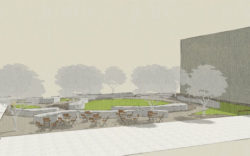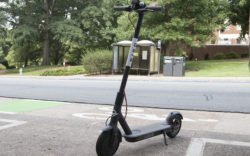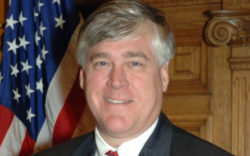As they move toward a final decision on what projects to include in SPLOST 2020, commissioners are discussing expanding that sales-tax referendum to include even more projects—and to run about a year longer to pay for them. If voters approve the package in November, the penny sales tax will be extended at least 10 more years to raise at least $278 million for capital projects ranging from parks and infrastructure to affordable housing and a new courthouse.
At last week’s work session, Commissioner Mike Hamby worried that park maintenance needs, including pool renovations at Bishop Park, were not sufficiently funded. Commissioner Tim Denson agreed, and suggested adding the additional year of collections. But the last-minute proposal frustrated Commissioner Russell Edwards: “Now we’re talking about shoehorning this thing in a couple of weeks before the [commission’s] SPLOST vote?” He asked to hear soon about any more “dire” needs of county departments. “I don’t want to get a bunch of phone calls the night before I have to take this vote,” he said. The final vote on the projects list, originally scheduled for July 2, will probably be pushed back a week or two.
Downtown Bike Lanes
Hancock Avenue downtown will be resurfaced this summer, and so, in accordance with the county’s recent bike/pedestrian plan, it has been evaluated for adding bicycle lanes. Hillary Essig, ACC’s new bicycle, pedestrian and safety coordinator, showed commissioners a proposed plan to add bike lanes along College Avenue—from the Greenway connection at Elizabeth Street up the hill to Hancock downtown— and then down Hancock to the existing bike lanes on Pulaski. Most would be separated from car traffic by pavement markings, while the lanes on Hancock would be further protected by placing them between the sidewalk and metered parking spaces. If commissioners approve, the changes will be made later this summer.
Recycling Costs Rise
For reasons both environmental and political—new landfills are almost impossible to site because nobody wants to live by one—ACC is committed to diverting recyclable waste away from the landfill, requiring local trash haulers and apartments to offer recycling and providing drop-off dumpsters around town. Local businesses cooperate, too, and citizens don’t have to separate cardboard or paper or glass or plastics—that’s done by hand and machine at the “murf” (the RMPF or Recyclable Materials Processing Facility). But “recycling right now is more expensive than the landfill,” Waste Reduction Administrator Joe Dunlop told commissioners.
Once separated and baled, most local recycling—65 tons is processed daily—is sold within the U.S., and much of it is sold within Georgia. Plastics can be turned into carpet, and Coca-Cola needs a lot of aluminum for cans, Dunlop said. But processing costs are up because people have gotten sloppier about contamination—dirty recycling can’t be used, and trash in recycling bins can ruin a whole load—and because prices are down for recycled materials. In the past, sales of ACC’s recyclables more than covered its processing costs, but not this year, when costs have exceeded income by over $200,000. “Markets almost always exist for clean materials—and ‘clean’ is the operative word there,” Dunlop said.
Citing “constant” complaints about noise and litter as multiple trash trucks roll through neighborhoods, commissioners asked for followup about the possibility of developing separate zones for each trash hauler (ACC limits them to six), or whether county trucks could take over all trash pickups.
No Roundabout for Hawthorne and Oglethorpe
“We love our roundabouts,” Transportation and Public Works Director Drew Raessler told commissioners, but replacing the traffic light at Oglethorpe and Hawthorne (adjacent to CVS) with a two-lane roundabout would cost well over $2 million and take parking spaces from adjacent businesses. Still, the intersection is a high priority for improvement (and funded by an earlier SPLOST). Raessler recommends keeping a stoplight, but changing the layout of the turn lanes so drivers can better see oncoming traffic. But Hawthorne has more serious problems than the intersection improvements can fix, he said. The corridor has been added to the regional transportation plan for possible eventual (and expensive) improvements.
Downtown Historic District Progresses
ACC’s Planning Department, along with graduate students at UGA, studied the histories of 47 downtown buildings that were included in a moratorium on demolitions that ACC commissioners passed in January, as a prelude to possibly including those buildings and others in an expanded downtown historic district. The areas being studied include three buildings just east of the current historic district (which is mostly east of Lumpkin Street), and dozens of buildings west of it (between Lumpkin and Newton streets).
Once the research is done, commissioners could make a designation decision toward year’s end. Whether designated or not, the students and planners will make available the stories, documents, and photos they’ve discovered about these downtown buildings. “We’ve really had these fantastic conversations with all kinds of folks,” Senior Planner Bruce Lonnee told commissioners.
Like what you just read? Support Flagpole by making a donation today. Every dollar you give helps fund our ongoing mission to provide Athens with quality, independent journalism.










